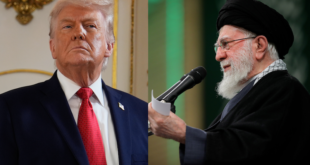Russia’s relations with countries through which it ships gas, power and coal to Europe have been characterized by frequent disputes.Moscow has branded as parasites the energy transit states that have benefited from shipping fees and cheap Russian energy and said Russia should stop subsidizing them.
Analysts have predicted relations would remain tense as Russia pursues an assertive foreign policy, but this is balanced by concern it could give the impression to western Europe it cannot be relied upon for secure supplies.
The following outlines the main transit states.
UKRAINE
Around 80 percent of Russia’s gas exports to Europe pass through Ukraine.
Ukraine has long haggled over how much it pays Russia for gas, but the row came to world attention in January 2006, when it led Gazprom to halt supplies to Ukraine. As a result, exports to Europe, which relies on Russia for 25 percent of its gas, were also affected.
The dispute was solved by Ukraine agreeing to pay roughly double for its gas.
Russia has made clear its strategy of trying to buy into infrastructure in transit states, but Ukraine has balked at the prospect.
Its parliament last year passed a law to ban the privatization, sale or lease of the country’s gas pipelines.
For its part, Russia has proposed building the Nord Stream pipeline to Europe, bypassing Ukraine.
BELARUS
Around 20 percent of Russia’s gas export to Europe flows through Belarus.
In addition the Druzhba, or Friendship, pipeline — which passes through Ukraine and Belarus — supplies Europe with around one tenth of its oil.
During a pricing dispute with Russia in January 2007, oil shipments through Belarus were halted for three days.
Belarus has also clashed with Moscow over the price it pays for its gas.
POLAND
Poland is a major transit country for Russian oil and gas exports to Europe. Both the Druzhba, or Friendship, oil pipeline, and the Yamal-Europe gas pipeline pass through Poland from Russia via Ukraine and Belarus.
In a dispute last year, Poland rejected a demand by Russian energy giant Gazprom for it to lower its fees for pumping Russian gas across Polish territory to Europe.
Along with other transit states, Poland is opposed to a Russian-German scheme to lay a pipeline under the Baltic Sea directly linking Russia and Germany, because of fears it would allow them to be cut off from Russian supplies.
TURKEY
Following various disagreements with Russia, Turkey has looked to diversify its import sources and has ambitions to be an energy hub, rather than a transit nation for Russia.
Turkey’s state-owned Botas is part of a consortium led by Austria’s OMV to build the Nabucco pipeline, which would transport gas from the Caspian, central Asia, reducing dependence on Russia.
Currently, the Blue Stream natural gas pipeline connects the Russian system to Turkey.
Russia, together with Italian oil company Eni has a project to extend the Blue Stream pipeline to southern Europe through Turkey.
It has also announced a 50/50 joint venture with Eni, known as South Stream, which would bypass Turkey.
THE BALTICS
The Baltic states of Estonia, Latvia and Lithuania serve as a vital transit location for Russian oil exports. The Russian crude oil pipeline system is connected to three ports on the Baltic Sea — Latvia’s port of Ventspils, Lithuania’s port of Butinge and the Russian port of Primorsk.
Smaller quantities of crude oil and significant quantities of oil products are also distributed by rail to other Baltic ports, such as Tallinn in Estonia.
ESTONIA
Russian oil firms have been shipping 25 million tons of refined oil products a year, a quarter of their exports, via Estonia, but volumes have fallen following a dispute with Moscow.
Shipments of other commodities, including metals and coal, through Estonia have also been reduced.
Relations deteriorated after Estonia in April last year moved a memorial to World War Two Red Army soldiers from a site in the city centre to a military centre, triggering two nights of riots by local Russia speakers.
LITHUANIA
In 2006 Russia shut the pipe to Lithuania’s Mazeikiu refinery.
Analysts have linked the oil stoppage to Lithuania’s decision to allow Polish company PKN Orlen to buy the refinery in which several Russian firms were interested.
LATVIA
In 2003, Russia closed an oil pipeline to Latvia’s Ventspils oil terminal. Russian officials have said Ventspils had little hope of recovering its crude supplies following Russia’s expansion of Primorsk.
 Eurasia Press & News
Eurasia Press & News


